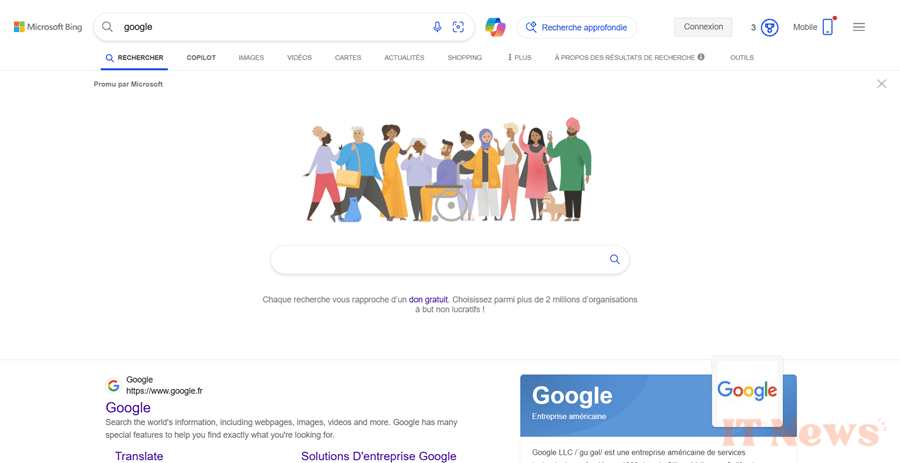Microsoft has a long history of trying to compete with Google. Recently, the company unveiled a particularly bold strategy aimed at temporarily transforming Bing into its direct competitor in order to captivate users who want to switch search engines.
A stunning visual ploy
When someone searches for “Google” on Bing, they come across a page that is strangely reminiscent of the minimalist interface of Google’s home page. The large central logo, accompanied by familiar animations and an identical search field, instantly immerses the user in an environment that they already know and that seems familiar.

Screenshot of Bing.fr on the query "Google"
All this happens before the Internet user has even had time to click on any link. According to several observers, this imitation would be a deliberate attempt by Microsoft to divert the attention of Internet users by capitalizing on Google's well-established brand image. The idea is that users, by believing they are already on Google, will involuntarily stay on Bing.
A practice repeated at Microsoft
This is not the first time that Microsoft has used questionable methods to promote Bing. In Windows 11, for example, certain links only open via Edge, the Redmond firm’s in-house browser. This approach clearly aims to limit users’ choices and subtly direct them towards Microsoft products.
Reactions are mixed among users: some see this as an annoying subterfuge, while others find this strategy intrusive. In any case, the main objective remains to curb Google’s overwhelming dominance in the field of online search. The current numbers highlight the huge difference in search volumes between Google and Bing, where Google continues to be the clear leader.
The impact on users
For many Internet users, this technique could create considerable confusion, especially for those who are not very technologically savvy. They could believe that they are already on Google when they are still on Bing. This intentional confusion raises ethical questions about Microsoft’s practices.
In addition, familiarity with Google’s interface has established itself over time, making it difficult for Bing to close this gap simply by mimicking it. Despite the addition of many interesting features on Bing, including the integration of artificial intelligence, Google remains deeply rooted in the collective unconscious as the search tool par excellence.
Microsoft’s other initiatives to counteract Google
This episode reflects a series of strategies deployed by Microsoft to encourage users to prefer Bing and Edge to Google and Chrome. Other attempts include frequent notifications on Windows promoting their own services, thus creating direct but often perceived as aggressive competition.
Although Google also uses notifications to attract users to Chrome, these incentives remain significantly less intrusive compared to Microsoft’s pop-ups. The main criticism against Microsoft is precisely this excessive proactivity that many describe as coercive and limiting.



0 Comments